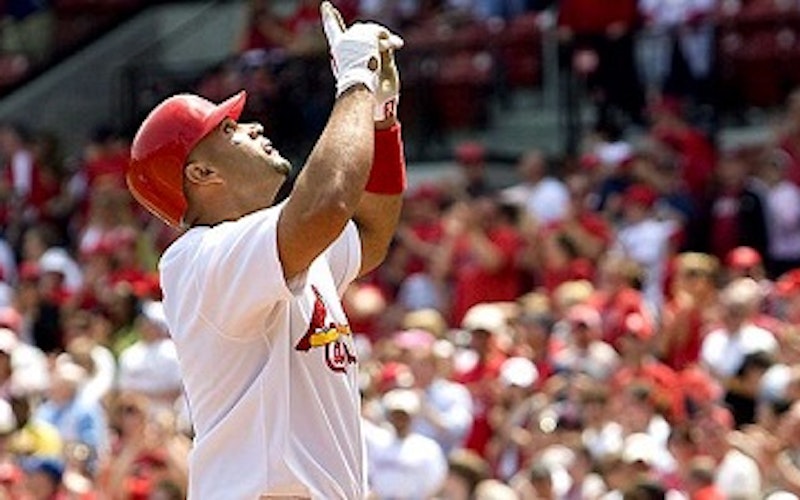
Culture At Large
Does Albert Pujols deserve exorbitant pay?
I’ve always had a mild, love-hate relationship with Albert Pujols. As a parent and little league coach, I’ve been in sheer awe of his skills and jaw-dropping numbers. The fact that he and his wife do charitable work through a foundation makes him a great role model too. Yet my son somehow almost always managed to draft him for his "Backyard Baseball" video-game team and little cartoon Albert would crush anything my pitcher could throw at him. So when the news emerged that Pujols would be playing hardball in contract negotiations with the team with which he has spent his entire major league career, purportedly to become baseball’s first $300-million dollar man, I became conflicted about which column of the score card to mark with an extra tally.
My initial reaction was that Pujols’ situation is symbolic of all that’s what’s wrong with sports - another spoiled, outrageously paid athlete demanding more at the expense of his team. But, in taking some time to reflect upon the situation, there is more to the picture.
To sign for a lower amount would seem to be the right thing for him to do, especially considering his Christian faith and the many warnings against greed in the Bible. Yet he is a franchise player and whether we like it or not, the prevailing rate for his very rare combination of talents is up there in the stratosphere. At the end of the day, his predicament is primarily a negotiation with team owners over how to divide the pot of money, isn’t it? If Pujols accepts less, team owners will benefit. Fewer dollars will be passed along to the foundation he and his wife operate and fewer people will be helped. Fans don’t stand to gain financially either. Ticket and merchandise prices are set by basic economics (supply and demand). As for his teammates, if they had his status and bargaining power, how many of them wouldn’t do the same?
On the other side of the (literal) coin, outrageously high levels of pay do raise serious questions. Take the issue of executive remuneration. When examined closely, the “they deserve it” and “market rate” defenses of big CEO salaries don’t hold up to scrutiny. Undoubtedly, running a large enterprise requires a unique skill set, long hours and is highly stressful, so differentials in pay (even fairly large ones) are acceptable. Yet the differences we have today cannot be justified by performance. And, “deserve” is often determined primarily by shareholder value, which is influenced by many factors, including the contributions of other personnel and economic conditions. Focusing so much on high pay also attracts CEOs who are about dollars alone. Doesn’t working for other reasons like serving an organization with a significant mission or being loyal to a community of people have value too?
Back to baseball. Drawn-out negotiations run the real risk of overlooking the value of teammates and may corrode the unity needed to win championships. No doubt Pujols is a key contributor, but baseball is a team sport. And while he may well deserve to be the sport’s highest paid player, if it’s true that he is demanding to be recognized as such, that surely seems to indicate that the temptation to swing at bad pitches is not the only thing that may need to be held in check. In contrast, there is almost universal admiration of the rare athlete who renegotiates a contract downward so the team can sign other quality players and compete for a title or one who accepts less on the free-agency market to stay loyal to an organization, fan base or to play close to home.
I don’t know what motivates Pujols. In fact, I often wonder what responsibility we fans - who spend so much time, money and emotional energy on pastimes that are at the end of the day superficial - have in enabling a sports world in which holding out for millions of dollars might be considered acceptable behavior. And yet, how different are the rest of us? While I have never threatened to leave unless my employer met my demands for a raise, rarely has the thought occurred to me that I am being paid too much.
Topics: Culture At Large, Business & Economics, Money, Economics, Arts & Leisure, Sports, Theology & The Church, The Church, News & Politics, North America